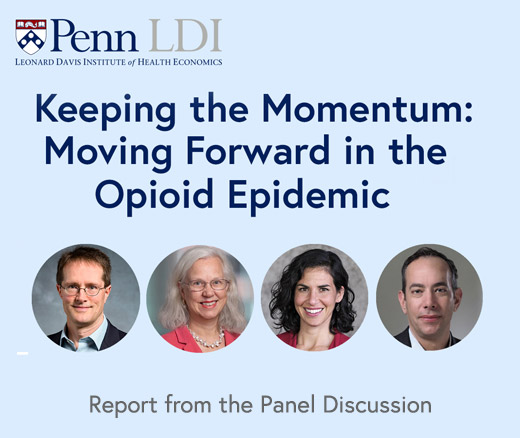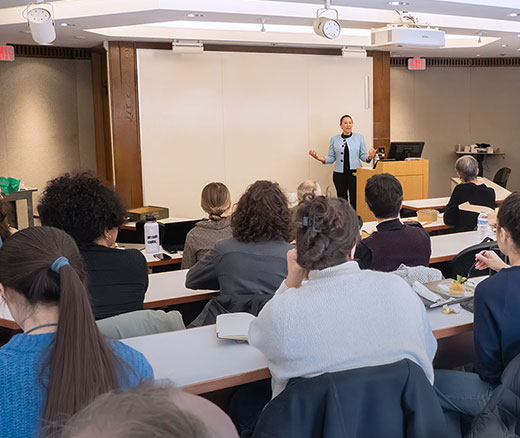
Experts Warn Addiction Policy is Weak Despite Falling Overdose Deaths
Penn LDI Panel Urges Family-Focused Strategy and Stronger Health System Response
News

They came for potential tips that might be gleaned from his extraordinary record of business moves. They came for his international celebrity as a Shark Tank star. They came to learn more about the inside story of his David-and-Goliath battle with health care’s Pharmacy Benefit Managers. And they came for the novelty of being in the presence of one of the world’s richest men: Mark Cuban.
So many hundreds of students, researchers, faculty and staff from the University of Pennsylvania Wharton School Health Care Management Department’s “Health Care Reform and the Future of the American Health Care System” and others came that they packed to standing-room-only the sprawling School of Nursing’s Fagin Hall Auditorium. And large numbers more were turned away at the door.
On stage, seated in stylish chairs, Cuban collegially sparred with Ezekiel Emanuel on the tangled issues of the county’s prescription drug pricing model. And what better authorities to debate the matter—Cuban, whose Cost Plus Drugs company is battling to disrupt the current entrenched pricing model, and Emanuel, the Penn Professor and bioethicist, LDI Senior Fellow, health policy expert, and prolific author on the subject who was a White House Consultant and key architect of the Affordable Care Act.
Cuban, best known for his 16-year stint as one of the shark investors on ABC’s Shark Tank and his 23-year ownership of the Dallas Mavericks NBA basketball team, is also a venture capitalist who has invested in more than 200 companies over his career.
In the early 1980s, as other pioneering entrepreneurs launched the IBM PC, MS-DOS, Windows 1.0, and the Apple Macintosh, Cuban co-founded MicroSolutions, a consultant company and systems integrator that assisted business clients in incorporating new systems like Lotus Notes and CompuServe into their desktop computer networks and marketing plans. In the 1990s as the World Wide Web became available, Cuban co-founded AudioNet to broadcast radio across on the new WWW interface. That became Broadcast.com, which evolved into an enormous streaming operation for sports, news, and entertainment audio and video. In 1999, it was acquired by Yahoo! for $5.7 billion.
In January of 2022 he and partner Alex Oshmyansky, MD, PhD launched the Mark Cuban Cost Plus Drug Company (MCCPDC), a privately held entity with multiple investors.

Billed as a Fireside Chat on the Drug Pricing Failures in America, the Cuban-Emanuel event at Penn was hosted by Emanuel’s fall Health Care Management Course “Health Care Reform and the Future of the American Health Care System” in collaboration with the Leonard Davis Institute of Health Economics (LDI) and the Wistar Institute.
The event came about as a collegial clash of sorts between Emanuel and Cuban after Emanuel authored an opinion piece in STAT suggesting that Cuban was doing good work but questioning the magnitude of impact Cost Plus Drugs will have because it only deals in generic drugs even as branded drugs drive the majority of costs in the prescription drug market.
Emanuel challenged Cuban to come defend himself in front of his Wharton Health Management class “Health Care Reform and the Future of the American Health Care System” composed of MBAs, medical students, doctors, law students and undergrads. Cuban agreed to come to Penn to take up that challenge and had no advance knowledge of the questions Emanuel would ask.
Opening the discussion, Emanuel noted the many giant corporations like Amazon, Berkshire Hathaway, JP Morgan Chase, and others that had recently attempted to disrupt U.S. health care in innovative new ways but failed in those endeavors. He asked Cuban how and why he got involved in the same market that had already proved so risky to others with the idea that he could do disruption better.
Cuban said that it started as an intellectual exercise in 2019 when he created a theoretical alternative health care financing system to the Affordable Care Act. That concept was called the 10Plan and received high marks in a RAND Corporation analysis, but was never widely adopted.
A few years later, when he learned that generic drugs were showing up on shortage lists more and more, Cuban said he wondered how that was possible. It was also the same period when Martin Shkreli hit the headlines for raising the price of a branded parasitic infection drug more than 5,000% and went to jail for securities fraud.
“These were some of the things that made me keep asking, ‘How can this happen?’,” Cuban said. “I began digging in to find that the drug side of the health care industry is an inefficient market and has no transparency whatsoever. You go to the doctor and the first thing they ask you is what pharmacy should they use for you—with no consideration of price or anything else. That’s the story of the industry. It’s impossible to find the price of a drug. I don’t mean that they make it too hard to find. I mean, you simply cannot find the price or cost of drugs.”
“This all got us thinking about creating the website company CostPlusDrugs.com, which is transparent,” he said. “We show you what we paid for the drug. We show you that our markup is 15%; there’s the $5 for the pharmacist to review it, and $5 for shipping it if you want it via mail order. And we publish our price list online.”
“Researchers around the country have been comparing what CostPlusDrugs sells versus what the Centers for Medicare and Medicaid Services (CMS) and other institutions pay for the same drugs,” Cuban continued. “And they’ve found a difference—and those findings have propelled us forward. We have now served millions of customers and have truly changed the game.”
Some of the latest journal analyses of CostPlusDrugs:
A February 2023 Journal of Urology study concluded, “We find a potential savings of approximately $1.29 billion in 2020 if Medicare prices for generic drugs were as low as those offered under [CostPlusDrugs.com]. We encourage providers and their practices to add this company to their list when counseling patients on how to access and pay for their medications.”
A June 2023 study in the Journal of Clinical Oncology concluded, “Replacing current Part D median formulary prices with [CostPlusDrugs.com] pricing could yield significant savings for seven generic oncology drugs.”
And an August 2024 study in PharmacoEconomics reported, “Total estimated Medicare Part D savings were $8.6 billion using 90-day [CostPlusDrugs.com] pricing, with surgical drugs accounting for over $900 million. Nearly 80% of the examined drugs were more price effective through [CostPlusDrugs.com] using 90-day supply. Commonly prescribed drugs in cardiology, psychiatry, neurology, transplant surgery, and urology demonstrated the highest estimated absolute savings.”
Essentially, Cuban’s CostPlusDrugs.com is in a David and Goliath struggle with the six Pharmacy Benefit Managers (PBMs) that, according to a recent Federal Trade Commission (FTC) report, control more than 90% of the U.S. prescription drug market.
PBMs are notoriously secretive about every aspect of their business, especially their costs and the controversial program that allows them to negotiate large rebates from drug manufacturers in exchange for favorable placement on formularies, potentially leading to higher drug prices for consumers. Critics have characterized the rebate system as a kickback scheme.
While PBMs’ controversial practices have prompted increased scrutiny and lawsuits from regulators, lawmakers, and public advocates trying to reform drug distribution, Cuban has invented his own structural solution to circumvent the PBMs’ market chokehold by offering lower prices through an online transparent pricing model that cuts out the PBMs as the middleman. (continued below video)
In January, Forbes profiled Cuban and spotlighted how, in an incredibly short period of time, he has achieved a dramatic disruption of the U.S. prescription drug distribution market: “Two years in, Mark Cuban’s company keeps shaking up the generic pharmaceutical space. It added another 1,000 medicines in December to the list of now 2,200 drugs it sells directly to patients. The firm now offers prescription drugs—mostly generics—to over 2 million members.”
“This industry is the easiest industry I’ve ever disrupted,” Cuban told Emanuel. “And all it took was transparency and just telling the truth.”
Emanuel asked Cuban—whose net worth is estimated by Forbes to be nearly $6 billion—if he would have been able to get into this market as fast as he did if he didn’t have a personal fortune. Cuban said “no,” he could not have done it without having his own money. He also pointed out that another advantage for Cost Plus Drugs is that it was set up as an American Public Benefit Corporation (PBC).
PBCs are for-profit companies that balance the pursuit of profits with bylaw commitments to create positive social change. They are legally protected from stockholder lawsuits in pursuing those goals in ways that don’t necessarily maximize short-term profits.
Along with its innovative approach to selling pharmaceuticals, Cost Plus Drugs has also recently made a move into drug manufacturing, opening its own plant in Dallas to make generic medications.
“There are so many drugs that are just having day-to-day supply shortages,” said Cuban. “So, we said let’s try to put something together built on robotics that allows us to manufacture and see how low we can get the cost, and how many vials of sterile injectables we can make,” said Cuban. “It took a few years and a little bit of money to create the manufacturing environment capable of cranking out 2 million vials, but now we’re going through the sales process and having no problems.”
Reflecting on his continuing expansion of Cost Plus Drugs, Cuban told Emanuel the reason he has become so attracted to the health care business is because it is “so screwed up.”
“No one thinks of U.S. health care and says, ‘Yeah, that’s really good’ or ‘I like the way it works,'” Cuban said. “No one looks at the pharmacy side and says, ‘This is the epitome of capitalism and market efficiency at its best.’ And whenever I see that, I see an opportunity. It makes you think of all these things you could accomplish if it was done differently.”
“If you look at the history of the supply chain,” Cuban continued, “there are people who have come up with really good ideas that have had an impact, but then somebody comes in to buy them up and kill them. Well, you know what? I don’t need any more money. I’m rich as hell. So, I don’t need to do this for more money. My joy comes from screwing the PBMs. Every one of these sales that we close [directly with the drug] manufacturers is like a great day with the sun shining brightly for me.”



Penn LDI Panel Urges Family-Focused Strategy and Stronger Health System Response

Remote Nurses Improved Quality Slightly but Can’t Replace Nurses at the Bedside, a New Study Finds

Washington State’s First-in-the-Nation Insurance Plan Begins Payouts in Mid-2026, and Researchers Will Weigh its Effect on Care, Costs, and the Long-Term Care Markets

Without Pressure From Congress, NHANES — Which Helped Uncover High Levels of Childhood Lead, Nutritional Deficiencies, and Forever Chemicals — Will Cease to Exist

A Multi-State Study Finds That Parents Often Travel 60+ Miles—With Distance, Insurance, and Race Driving Gaps in Maternal Care

Former CMMI Leader Liz Fowler Cites Rigid Federal Scoring Rules and Bureaucratic Impatience for Pilot Failures